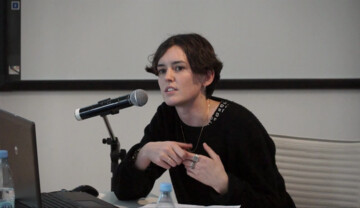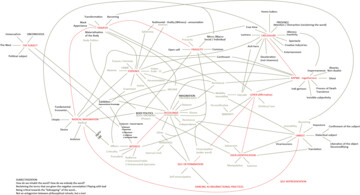Decolonise: to operate on the nodes of hegemonic affect.
Decoloniality: a program of hybrid tactics that traverse materiality and writing, memory and → archive, affect and body.
Decolonisation: a collective process of subjectivisation.
Note: The subject of the decolonial revolution does not exist. It is produced in the process of decolonisation.
The program of action for operating on contemporary coloniality begins by fragmenting the binary code through which we understand colonial violence in the neoliberal era. This is a binary code of simple divisions between the past and present, the north and → south, the First and the Third Worlds.
The process of decolonisation requires various forms of anti-racist, migrant and subaltern oppositions. However, these strategies alone do not succeed in modifying the Eurocentric and logocentric terms that regulate the truth-body and hierarchise lives, as well as legitimise and naturalise the process of hierarchisation. The truth-body is reproduced through techniques of racialisation and sexualisation operating and legitimised in Europe today. To decolonise affect is thus to reinvent subjectivities that escape the truth of the body produced by colonial violence.
The knowledge and poetic-political strategies accumulated by a critical diaspora responding to the first signs of neoliberal colonial violence in the 1980s offer clues here. Valerie Mason-John aka Queenie, CambellX, Adrienne Rich, Black Audio Film Collective, Pedro Lemebel, Nestor Perlongher, Audre Lorde, Cheryl Clarke, Gloria Anzaldúa, Pratibha Parmar, Essex Hemphill, May Ayim, Strange Fruit, Kanak Attack and Salon Oriental together irritate the binary codes of simple divisions that divide up and reduce affect to the modern, humanist and Eurocentric sensibility. Fatima El-Tayeb (2011) calls this displacement, accumulation, and activation of multiple and translocal strategies creolising theory. The decolonising process of subjectivisation includes creolising tactics: ridding theory and poetry of its pretensions by exploring the often tense relations between specific circumstances and universal conditions, local applications and global connections, without dissolving them through a → universalising model of interpretation.
If the subject of the decolonial revolution does not exist it is because it must be produced through a hybrid program that operates on various levels: between the dominant narratives of history and the sensibilities that these produce; between the conditions of the production of knowledge and the materiality of the body. If this body is marked by the colonial system of writing that we know as the truth-body, the subject of decolonisation is produced and invented through this very same process of writing, of reconstituting and inventing the archive. This writing – this process of subjectivisation – is a decolonial program that irritates and dismantles the modern, humanist and Eurocentric sensibility, making a cut in the flow of modern-colonial affect.
Decolonisation is a process of collective subjectivisation, a violent program of rewriting the subject-body and dismantling the truth-body. Decoloniality rehearses a violence that consists of denaturalising and de-ordering hierarchies of affect by putting into practice the strategies invented by micropolitical struggles, which together have managed to break the linearity of history and the linearity of the truth-body. Practices of sexual disobedience and the black and radical feminisms have developed these collective practices of resistance, self-production, forms of opposition and poetic-political writing.
All too often the anti-colonial and anti-racist discourses forget and ignore the production of these knowledges and end up repeating the key terms of hegemonic affect: humanism/genocide, modernism/colonialism. This erasure and forgetting reproduce discourses rooted in shame and colonial guilt. The repetition of this divided affectivity, in turn, collaborates actively to erase and eliminate the archive of resistance of the critical diaspora. Resisting the discourse of shame — not from the South but from the centre of production of the colonial truth-body — is an act of radical revenge and a strategy of rewriting.
Program:
- Produce a new body, → intervening precisely where the techniques of racialisation and sexualisation divide up affects and design hierarchies in the world.
- Activate and invent a radical archive that serves the memory of this body in decolonisation.
- Intervene in the technologies that silence resistances and invent counter-technologies. Reappropriate the languages and voices of distinct micropolitical struggles. Understand their contributions to the decolonial program.
- Exercise → radical revenge through writing as direct action. Rewrite-inscribe to restore the erasure. Traverse the inaudible and unsayable fields of coloniality. Invent the archive.
- Write, resist, create alliances and modify affects.



